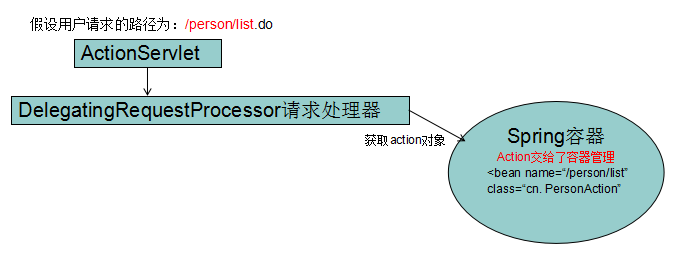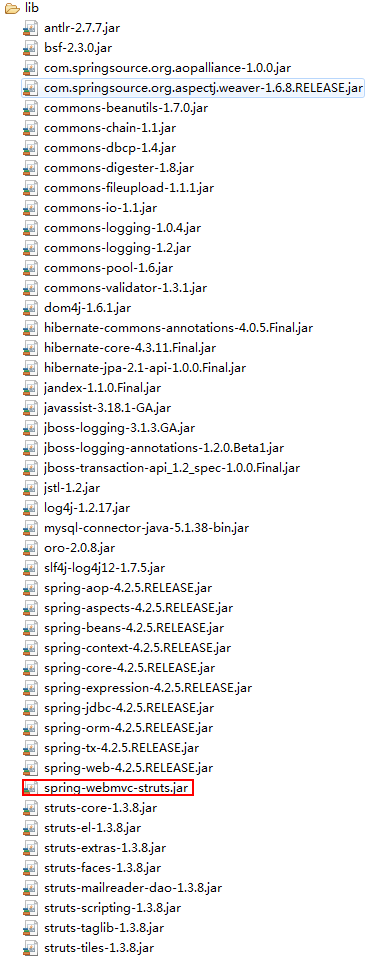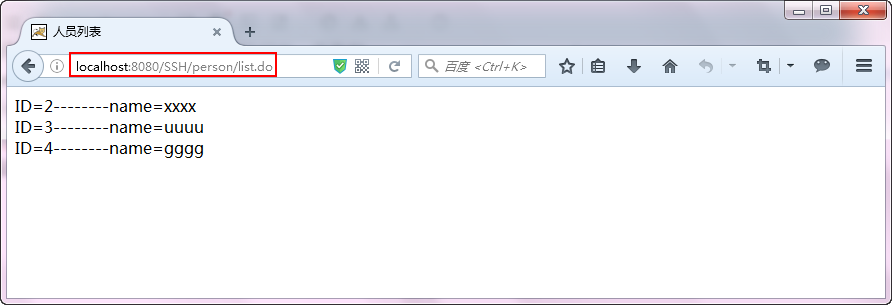文章40 | 阅读 20659 | 点赞0
Spring4.2.5+Hibernate4.3.11+Struts1.3.8集成方案二
前面我们已经集成了Spring4.2.5+Hibernate4.3.11+Struts1.3.8,但是集成的方案并不完美,因为我们在Action里面每次要取得Spring容器实例,都必须有这样的代码:
WebApplicationContext ctx = WebApplicationContextUtils.getWebApplicationContext(
this.getServlet().getServletContext());是不是很招人烦啊!而且这还会导致Struts的action跟Spring紧密耦合,因为我们使用到了Spring里面的类了。这时我们就想能不能采用Spring依赖注入的方式直接将其注入进来呢?我们应知道如果我们要使用Spring的依赖注入,前提是bean必须交给Spring容器进行管理。所以,我们要把action交给Spring管理,这样我们可以使用依赖注入在action中注入业务层的bean。注意,要确保action的path属性值与bean的名称相同。如果Struts配置文件中的<action>元素为:
<action path="/person/list" ...>
</action>那么在把action交给Spring管理时,Spring配置文件中应添加如下配置:
<bean name="/person/list" class="cn.itcast.web.action.PersonAction"/>除此之外,我们还要在Struts配置文件中添加进Spring的请求控制器,该请求控制器会先根据action的path属性值到Spring容器中寻找跟该属性值同名的bean,如果寻找到即使用该bean处理用户请求。即在Struts配置文件中添加如下配置:
<controller>
<set-property property="processorClass" value="org.springframework.web.struts.DelegatingRequestProcessor" />
</controller>至此,Struts配置文件——struts-config.xml的内容就是:
<?xml version="1.0" encoding="UTF-8" ?>
<!DOCTYPE struts-config PUBLIC "-//Apache Software Foundation//DTD Struts Configuration 1.3//EN" "http://struts.apache.org/dtds/struts-config_1_3.dtd">
<struts-config>
<action-mappings>
<action path="/person/list" validate="false">
<forward name="list" path="/WEB-INF/page/personlist.jsp"></forward>
</action>
</action-mappings>
<controller>
<set-property property="processorClass" value="org.springframework.web.struts.DelegatingRequestProcessor" />
</controller>
</struts-config>Spring配置文件——beans.xml的内容就是:
<?xml version="1.0" encoding="UTF-8"?>
<beans xmlns="http://www.springframework.org/schema/beans" xmlns:xsi="http://www.w3.org/2001/XMLSchema-instance" xmlns:context="http://www.springframework.org/schema/context" xmlns:aop="http://www.springframework.org/schema/aop" xmlns:tx="http://www.springframework.org/schema/tx" xsi:schemaLocation="http://www.springframework.org/schema/beans http://www.springframework.org/schema/beans/spring-beans.xsd http://www.springframework.org/schema/context http://www.springframework.org/schema/context/spring-context-4.2.xsd http://www.springframework.org/schema/aop http://www.springframework.org/schema/aop/spring-aop-4.2.xsd http://www.springframework.org/schema/tx http://www.springframework.org/schema/tx/spring-tx-4.2.xsd">
<context:annotation-config />
<bean id="dataSource" class="org.apache.commons.dbcp.BasicDataSource" destroy-method="close">
<property name="driverClassName" value="com.mysql.jdbc.Driver" />
<property name="url" value="jdbc:mysql://localhost:3306/jdbc?useUnicode=true&characterEncoding=UTF-8" />
<property name="username" value="root" />
<property name="password" value="yezi" />
<!-- 连接池启动时的初始值 -->
<property name="initialSize" value="1" />
<!-- 连接池的最大值 -->
<property name="maxActive" value="500" />
<!-- 最大空闲值。当经过一个高峰时间后,连接池可以慢慢将已经用不到的连接慢慢释放一部分,一直减少到maxIdle为止 -->
<property name="maxIdle" value="2" />
<!-- 最小空闲值。当空闲的连接数少于阀值时,连接池就会预申请去一些连接,以免洪峰来时来不及申请 -->
<property name="minIdle" value="1" />
</bean>
<bean id="sessionFactory" class="org.springframework.orm.hibernate4.LocalSessionFactoryBean">
<property name="dataSource" ref="dataSource" /> <!-- 数据源 -->
<property name="mappingResources">
<list>
<value>cn/itcast/bean/Person.hbm.xml</value> <!-- Hibernate的实体bean的映射文件(可有多个) -->
</list>
</property>
<!-- hibernateProperties是用来配置Hibernate的属性信息 -->
<property name="hibernateProperties">
<value>
hibernate.dialect=org.hibernate.dialect.MySQLDialect
hibernate.hbm2ddl.auto=update
hibernate.show_sql=false
hibernate.format_sql=false
</value>
</property>
</bean>
<!-- 配置针对Hibernate的事务管理器,事务管理器对sessionFactory对象创建出来的session进行管理 -->
<bean id="txManager" class="org.springframework.orm.hibernate4.HibernateTransactionManager">
<property name="sessionFactory" ref="sessionFactory"/>
</bean>
<tx:annotation-driven transaction-manager="txManager" />
<bean id="personService" class="cn.itcast.service.impl.PersonServiceBean" />
<bean name="/person/list" class="cn.itcast.web.action.PersonAction" />
</beans>注意一点,我们要向SSH项目中导入如下jar文件:
否则org.springframework.web.struts.DelegatingRequestProcessor该类将会找不到,org.springframework.web.struts.DelegatingRequestProcessor该类的处理过程为:
这样,总共需要向SSH项目中导入的jar文件有47个:
如此一来,PersonAction的代码就应该改为:
public class PersonAction extends Action {
@Resource PersonService personService;
@Override
public ActionForward execute(ActionMapping mapping, ActionForm form, HttpServletRequest request,
HttpServletResponse response) throws Exception {
request.setAttribute("persons", personService.getPersons());
return mapping.findForward("list");
}
}我们采用这种方式,可以看到并没有使用到Spring里面的任何类。查看数据库person表,可以看到person表有如下记录:
这时,我们通过浏览器访问url地址:http://localhost:8080/SSH/person/list.do,可以看到如下结果:
至此,说明Spring4.2.5+Hibernate4.3.11+Struts1.3.8集成的第二种方案成功了,而且这种方式更加优雅,实际开发中就该这样做。如须查看源码,可点击**Spring4.2.5+Hibernate4.3.11+Struts1.3.8集成方案二**进行下载。
版权说明 : 本文为转载文章, 版权归原作者所有 版权申明
原文链接 : https://liayun.blog.csdn.net/article/details/52894958
内容来源于网络,如有侵权,请联系作者删除!




